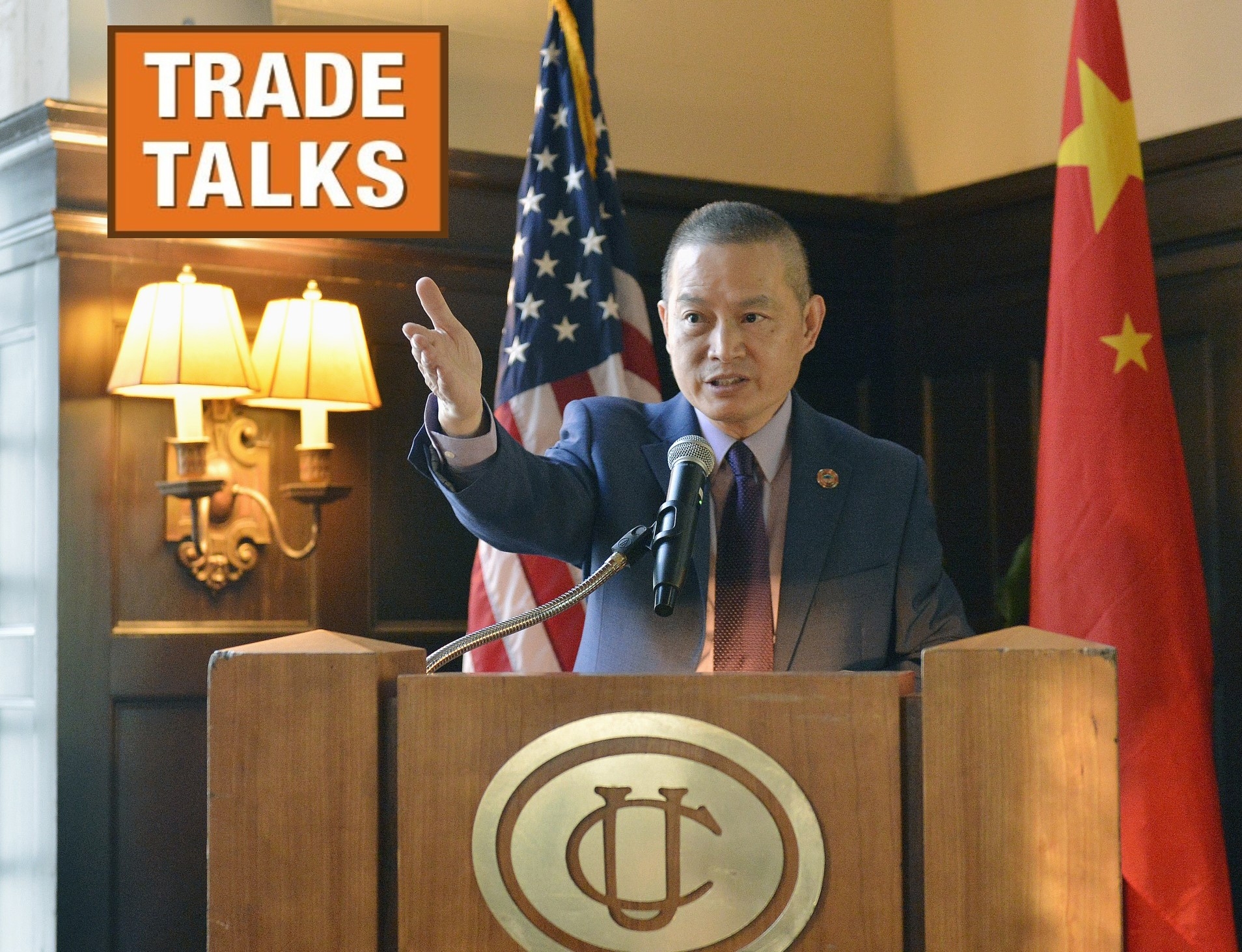A surge in prejudice against Asian Americans undermines relations with the state’s largest trading partner.
As the most trade-dependent state in the country, Oregon relies heavily on imports and exports to China. The Asian country purchased $7.2 billion of Oregon’s goods – from computer chips to agricultural products – in 2019.
The state’s next largest trading partner is Canada, which bought $3.4 billion of goods.
The Trump administration’s trade war saw tariffs and retaliatory fees exchanged between the world’s two largest economies. The Biden administration has eased, but not yet removed, the tariffs. This week it issued new sanctions against China for alleged human rights abuses against Uighur Muslims.
RELATED STORY: Trade War Pounds Oregon From All Angles
The year 2020 saw tense trade disputes, a global pandemic, social unrest and a rise in hate crimes targeting the Asian American community. In this interview, Jin Lan, president of the Oregon China Council, explains how his organization’s work managing relations between Oregon and its biggest trade partner has never been more difficult and more necessary.
This interview has been edited for length and clarity.
Why has managing Oregon-China relations become more important over the past year?
Phrases used by top officials in the Trump administration like “Wuhan Flu,” “The China Virus,” and “Kung-Flu,” have deepened the prejudice and bias against Asian markets. People were afraid of the pandemic and that was associated with the Chinese. Social media has amplified the culture of fear with echo chambers that erode evidence-based decision-making.
We are a bipartisan effort to enhance people-to-people interactions, which can directly impact outcomes. The increased political tensions, the pandemic and prejudice have made our council even more pivotal.
In January of 2020, before they shut down the state, we held an event at the Oregon Chinese Coalition that was attended by Gov. Kate Brown. During the event, she wrote: “We stand together with the Chinese people in our fight against COVID-19.” It wasn’t reported on here, but it actually got a lot of publicity inside of China.
At the time there were a lot of negative reports coming out about China, and Gov. Brown extended a hand of friendship. That one comment paved the way for China’s Fujian Province, Oregon’s sister state, to donate 50,000 protective face masks to Oregon in April.
It just goes to show that a friend in need is a friend indeed.
The U.S. has experienced a rise in anti-Asian hate crimes, including the recent mass shooting in Atlanta. Has this affected the work you do?
Racism has impacted our council in a very real way. People have asked us, “Where is your loyalty?” Someone even painted a stone with a picture of a virus and threw it in my front lawn.
Racism against Chinese Americans isn’t anything new, but this year has been particularly vicious. After the recent killings in Atlanta, some of my friends in China called because they were concerned about Oregon’s Chinese and other Asian communities.
We have hosted webinars for Chinese students and their parents who are scared to death. Oregon has one of the largest concentrations of Chinese students in the United States, over 3,000, which provides revenue to our education system.
Our council has also to address their fears related to the Black Lives Matter demonstrations. My friends in China were concerned about Portland because the media was saying the city was in chaos and everything had burned down. I had many conversions with our partners in China explaining how Portland was still a nice place to live and do business.
We all have to work, and that means working together. When people hold vigils and show Oregon is a society of immigrants, it tells people that violence and racism is only a small part of our society.
Chinese exports to the U.S. increased 154% in February compared to the same period last year. Imports rose by 17%. How does this affect Oregon’s recovering economy?
China is scooping up supplies of U.S. white wheat to feed livestock, pushing export forecasts to a 27-year high. The booming export market for white wheat has sent cash prices at the Portland export hub hovering around $7.50 a bushel, up 35% from July.
The recent increase in purchasing white wheat will benefit Pacific Northwest farmers.
In October of last year, we worked with the Oregon Department of Agriculture and our partners in Tianjin and Fujian to host an Oregon agricultural promotion over Zoom, which was very well attended. Each of those events has legislators from Oregon and China involved.
I am certain that under the Biden administration’s trade agenda more Oregon farmers will benefit, especially in wheat, cranberry, seafood, hazelnuts, grass seeds and animal feeds.
How has the Biden administration’s trade policy been different from the previous one?
One of the hallmarks of the Biden administration’s trade policy is a “worker-centered” approach, which means our farmers and workers should be the beneficiaries of our bilateral relationship.
When you look at the Biden administration’s trade policy goals, they are to grow the middle class and that is exactly what Oregon’s relationship with China is doing. Oregon is one of the few states that actually has a trade surplus with China. When trade with China is impacted, that’s more than 40,000 good, family-wage jobs on the line.
The Biden administration recently unveiled sanctions against China for alleged human rights abuses against Uighur Muslims. How does this conflict impact trade relations?
The sanctions are mostly in political areas and won’t impact Oregon exports directly but could impact import business such as apparels in sports or consumer clothing.
There is no question that human rights violations have occurred in both countries, but decoupling is not a solution to these problems. No one wins. The Chinese view what happened in Atlanta as a huge human rights violation. They see what is happening at the southern border and the events which led to the Black Lives Matter demonstrations as violations, and they view the United States’ treatment of the native population as a genocide.
I would encourage humility and engagement. There is always another side to the story. We need people who have an understanding of both cultures to shift the paradigm.
China has seen a rise in e-commerce since the pandemic. How will this impact trade with Oregon?
China’s cross-border e-commerce sector has expanded rapidly in recent years, with small and medium-sized e-commerce platforms maintaining an annual growth rate of 30%.
The Oregon China Council is working with Business Oregon to encourage Oregon companies to learn about e-commerce development in China. Rising consumer spending power and enthusiasm for online shopping are driving businesses to tap into China.
To subscribe to Oregon Business, click here.








